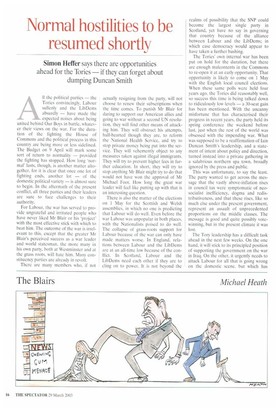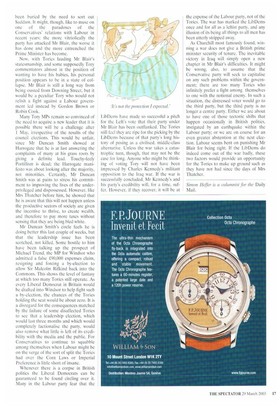ormal hostilities to be resumed shortly
Simon Heifer says there are opportunities ahead for the Tories — if they can forget about dumping Duncan Smith
lithe political parties — the Tories convincingly, Labour sullenly and the LibDems absurdly — have made the expected noises about being united behind Our Boys in battle, whatever their views on the war. For the duration of the fighting the House of Commons and the political process in this country are being more or less sidelined. The Budget on 9 April will mark some sort of return to normality — provided the fighting has stopped. How long 'normal' lasts, though, is another matter altogether, for it is clear that once one lot of fighting ends, another lot — of the domestic political variety — is almost sure to begin. In the aftermath of the present conflict, all three parties and their leaders are sure to face challenges to their authority.
For Labour, the war has served to provide ungrateful and irritated people who have never liked Mr Blair or his 'project' with the most effective stick with which to beat him. The outcome of the war is irrelevant to this, except that the greater Mr Blair's perceived success as a war leader and world statesman, the more many in his own party, both at Westminster and at the grass roots, will hate him. Many constituency parties are already in revolt.
There are many members who, if not actually resigning from the party, will not choose to renew their subscriptions when the time comes. To punish Mr Blair for daring to support our American allies and going to war without a second UN resolution, they will find other means of attacking him. They will obstruct his attempts, half-hearted though they are, to reform the National Health Service, and try to stop private money being put into the service. They will vehemently object to any measures taken against illegal immigrants. They will try to prevent higher fees in further education. In short. they will try to stop anything Mr Blair might try to do that would not have won the approval of Mr Michael Foot. How long the great war leader will feel like putting up with that is an interesting question.
There is also the matter of the elections on I May for the Scottish and Welsh assemblies, in which no one is predicting that Labour will do well. Even before the war Labour was unpopular in both places, with the Nationalists poised to do well. The collapse of grass-roots support for Labour because of the war can only have made matters worse. In England, relations between Labour and the LibDems are at an all-time low because of the conflict. In Scotland, Labour and the LibDems need each other if they are to cling on to power. It is not beyond the realms of possibility that the SNP could become the largest single party in Scotland, yet have no say in governing that country because of the alliance between Labour and the LibDems; in which case democracy would appear to have taken a further bashing.
The Tories' own internal war has been put on hold for the duration, but there are enough malcontents in the Commons to re-open it at an early opportunity. That opportunity is likely to come on 1 May with the English local council elections. When these same polls were held four years ago, the Tories did reasonably well, so success this time is being talked down to ridiculously low levels — a 30-seat gain has been mentioned. With the uncanny misfortune that has characterised their progress in recent years, the party held its spring conference the weekend before last, just when the rest of the world was obsessed with the impending war. What was supposed to be a reaffirmation of lain Duncan Smith's leadership, and a statement of intent about policy and direction, turned instead into a private gathering in a salubrious northern spa town, broadly ignored by the press and public.
This was unfortunate, to say the least, The party wanted to get across the message that the vastly above-inflation rises in council tax were symptomatic of neosocialist inefficiency, dogma and redistributiveness, and that these rises, like so much else under the present government, represent an assault of unprecedented proportions on the middle classes. The message is good and quite possibly votewinning, but in the present climate it was lost.
The Tory leadership has a difficult task ahead in the next few weeks. On the one hand, it will stick to its principled position of supporting the government on the war in Iraq. On the other, it urgently needs to attack Labour for all that is going wrong on the domestic scene. but which has been buried by the need to sort out Saddam. It might, though, like to muse on one of the paradoxes of the Conservatives' relations with Labour in recent years: the more vitriolically the party has attacked Mr Blair, the worse it has done and the more entrenched the Prime Minister has become.
Now, with Tories lauding Mr Blair's statesmanship, and some supposedly Tory commentators almost in the position of wanting to have his babies, his personal position appears to be in a state of collapse. Mr Blair is still a long way from being ousted from Downing Street, but it would be a peculiar Tory who would not relish a fight against a Labour government led instead by Gordon Brown or Robin Cook.
Many Tory MPs remain so convinced of the need to acquire a new leader that it is possible there will be a challenge after I May, irrespective of the results of the council elections. This would be unfair, since Mr Duncan Smith showed at Harrogate that he is at last answering the complaints of many at his grass roots by giving a definite lead. Touchy-feely Portillism is dead; the Harrogate manifesto was about looking after the majority, not minorities. Certainly, Mr Duncan Smith was at pains to stress his commitment to improving the lives of the underprivileged and dispossessed. However, like Mrs Thatcher before him, he showed that he is aware that this will not happen unless the productive sectors of society are given the incentive to thrive, to create wealth, and therefore to pay more taxes without sensing that they are being bled white.
Mr Duncan Smith's circle feels he is doing better this last couple of weeks, but that the leadership issue has been scotched, not killed. Some hostile to him have been talking up the prospect of Michael Trend, the MP for Windsor who admitted a false £90,000 expenses claim, resigning and forcing a by-election to allow Sir Malcolm Rifkind back into the Commons. This shows the level of fantasy at which too many Tories still operate. As every Liberal Democrat in Britain would be drafted into Windsor to help fight such a by-election, the chances of the Tories holding the seat would be about zero. It is a disregard for the consequences matched by the failure of some disaffected Tories to see that a leadership election, which would last three months and which would completely factionalise the party, would also remove what little is left of its credibility with the media and the public. For Conservatives to continue to squabble among themselves when Labour might be on the verge of the sort of split the Tories had over the Corn Laws or Imperial Preference is little short of insane.
Whenever there is a corpse in British politics the Liberal Democrats can he guaranteed to be found circling over it. Many in the Labour party fear that the LibDems have made so successful a pitch for the Left's vote that their party under Mr Blair has been outflanked. The Tories still feel they are ripe for the picking by the LibDems because of that party's long history of posing as a civilised, middle-class alternative, Unless the war takes a catastrophic turn, though, that may not be the case for long. Anyone who might be thinking of voting Tory will not have been impressed by Charles Kennedy's militant Opposition to the Iraq war. If the war is successfully concluded, Mr Kennedy's and his party's credibility will, for a time, suffer. However, if they recover, it will be at the expense of the Labour party, not of the Tories. The war has marked the LibDems once and for all as a leftist party, and any illusion of its being all things to all men has been utterly stripped away.
As Churchill most famously found, winning a war does not give a British prime minister security of tenure. The inevitable victory in Iraq will simply open a new chapter in Mr Blair's difficulties. It might be wrong, also, to assume that the Conservative party will seek to capitalise on any such problems within the government; there are too many Tories who infinitely prefer a fight among themselves to one with the notional enemy. In such a situation, the distressed voter would go to the third party, hut the third party is no longer a centre party. Either we are about to have one of those tectonic shifts that happen occasionally in British politics, instigated by an earthquake within the Labour party; or we are on course for an even greater abstention at the next election. Labour seems bent on punishing Mr Blair for being right. If the LibDems do indeed come out of the war badly, these two factors would provide an opportunity for the Tories to make up ground such as they have not had since the days of Mrs Thatcher.
Simon Heifer is a columnist for the Daily Mail.









































































 Previous page
Previous page